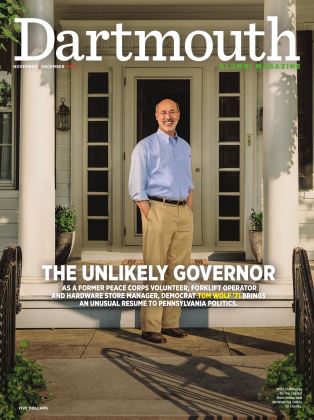Ipresent here ’88s in the military, Part II.
Cynthia Marshall laughingly refers
to her “commitment issues” when asked about her pre-Army careers, which included admissions officer, fundraiser, operations consultant and stu- dent—she has an M.A. from Johns Hopkins School of Advanced International Studies and earned a law degree at age 40. An Army lawyer for nearly eight years, Cynthia will be promoted to major, ef- fective December 1. She’s just finished three years living and teaching constitutional and military law at West Point. “Being on their faculty is prob- ably the best posting in the Army. It’s a beautiful, historic place and the cadets are some of the most inspiring college-aged people you’ll ever meet. For fun, when you talk to West Point grads, ask how many hours they walked and why.” The Army will next send Cynthia to its judge advocate generals legal center and school to get an LL.M. in military law. Cynthia notes that a highlight of her time at West Point was a visit by Susan and Jim Wright, who spoke to the faculty about creating an inclu- sive environment at a formerly all-male institution. “They impressed everyone. Jim gave great lectures to cadets about America’s historic relationship with its veterans and the origins of the GI Bill and about My Lai. It was a great two days, making me even more proud of Dartmouth.”
John Sinnott writes, “After graduating I re- ported to Marine Corps Officer Candidate School in Quantico, Virginia, where I unexpectedly ran into Oliver Jenkins before we had the pleasure of having our heads shaved for the first time. Subse- quent duty stations included Lawton, Oklahoma (artillery school); Mount Fuji, Japan (platoon com- mander, cold weather training, work with Japan’s self defense forces); Okinawa, Japan (fire direc- tion officer, jungle warfare school); and San Diego (series commander at Marine Corps boot camp, leading drill instructors and recruits undergoing the transformation from civilians to Marines). I ended up in New Orleans. Now a lawyer, I defend pharmaceutical companies and other manufactur- ers in mass tort litigation. My wife, Ann, and I have two sons, ages 9 and 7.”
Tim Stretch joined the Air Force after gradua- tion and was recently promoted to colonel. He has flown F-16s for most of his career, both on active duty and as a reservist, “including a great time in the late 1990s with the Green Mountain Boys of the Vermont Air National Guard.” After marrying Tim shifted gears, spending a few years as a com-
mercial pilot for United. He rejoined the Air Force after 9/11, and served as an instructor in Arizona for 10-plus years. Since then, “I’ve had numerous tours over Iraq, Bosnia and Afghanistan. My wife, Heather, and our two kids, ages 12 and 9, are cur- rently stationed in Germany—headquarters for U.S. air forces in Europe and Africa—where I fly a desk.” Tim says they travel as often as they can, although “President Putin keeps hampering our travel agenda.”
The Navy sponsored Rowland Wu’s medical education at Columbia and also permitted him to continue his civilian medical training with an anesthesiology residency at Massachusetts Gen- eral Hospital while on inactive reserve. Rowland switched to active duty in 1997, completing basic training in Newport, Rhode Island, then serving as assistant professor of anesthesiology at the Nation- al Naval Medical Center in Bethesda, Maryland. During tours on the USS Comfort Rowland visited Sweden and Lithuania. “Someone was watching over me. I was never sent into harm’s way; the real thanks go out to all the residents I trained who were sent into action.” Since retiring as a lieutenant commander in 2001, Rowland has been in private practice in Boston.
34 Wearimus Road, HoHoKus, NJ 07423; d88correspondent@gmail.com
 View Full Issue
View Full Issue
More From This Issue
-
 Cover Story
Cover StoryThe Unlikely Governor
November | December 2015 By JULIA M. KLEIN -
 FEATURE
FEATUREEnlightened Reading
November | December 2015 By Jessica Fedin ’17 and Savannah Maher ’17 -
 FEATURE
FEATUREMeanwhile, In Illinois
November | December 2015 By JULIA M. KLEIN -
 Feature
FeatureWhat a Racket!
November | December 2015 By C.J. Hughes ’92 -
 Feature
FeatureClassnotes
November | December 2015 By LIBRARY COLLEGE DARTMOUTH -
 Feature
FeatureNotebook
November | December 2015 By SHERMAN JOHN
Jere Mancini
-
 Class Notes
Class Notes1988
NOVEMBER | DECEMBER 2013 By Jere Mancini -
 Class Notes
Class Notes1988
JANUARY | FEBRUARY 2014 By Jere Mancini -
 Class Notes
Class Notes1988
MARCH | APRIL By Jere Mancini -
 Class Notes
Class Notes1988
JULY | AUGUST 2016 By Jere Mancini -
 classnotes
classnotes1988
MARCH | APRIL 2018 By Jere Mancini -
 classnotes
classnotes1988
JULY | AUGUST 2018 By Jere Mancini
Class Notes
-
 CLASS NOTES
CLASS NOTES2013
MAY | JUNE 2023 By Aly Perez -
 Class Notes
Class Notes1962
December 1989 By Charlie Giersch -
 Class Notes
Class NotesClass of 1915
January 1935 By Harold K. Davison, Esq. -
 Class Notes
Class Notes1939
MARCH 1965 By HENRY CONKLE, ALAN V. TISHMAN -
 Class Notes
Class Notes1939
October 1955 By JOHN R. VINCENS, DON C. WHFATON JR. -
 Class Notes
Class NotesCLASS OF 1911
By Joshua B. Clark

